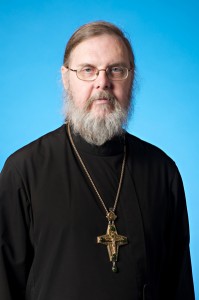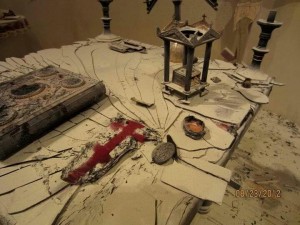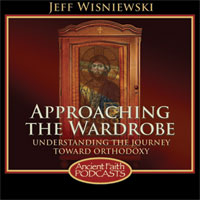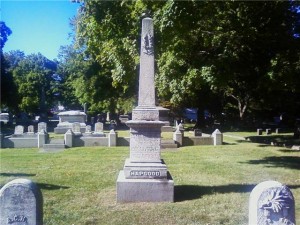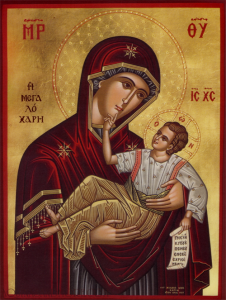I have written on this topic before, but I thought it deserved a little more attention in the light of an essay that has recently been written.
In the essay, the author writes about the loss of Metropolitan Jonah, the former head of the Orthodox Church in America. I agree that this was a shock to American Orthodoxy, but Orthodoxy is and has to be larger than one person. Yes, Metropolitan Jonah was a breath of fresh air. He spoke the way bishops are supposed to speak. He told the truth without any concern for the political fallout, and that is how bishops are supposed to speak. But if we roll up the sidewalks, so to speak, because he is gone then we are not following the example that he set for us. We need to learn from what he did and continue, we must continue to preach the truth in a society that is only interested in hearing what they want to hear. We need to move past this and get back to our message, and we need to continue to work to bring America to Orthodoxy, that is the legacy of Metropolitan Jonah. He charter the course for us and we need to continue his mission.
One of the realizations I have come to recently is, Orthodoxy is for everyone but not everyone is ready for Orthodoxy. We are calling people to live a life that most people cannot live because society does not want them to live that way. Our American culture calls us to a life of hedonism. American culture calls us to live how we want to live without regard for the consequences. Our culture tells us it is someone else’s fault, not our own and so we have a whole generation that feels they are entitled to an education, health care, employment, food, housing etc. and they do not have to work for it. Not exactly what our country was built upon. And thanks to the many churches that want you to feel good about yourself, we have an American theology that back all of that up!
Enter Orthodox into that picture and the culture will not only clash but smash into each other at a high rate of speed.
If you are a long time reader of these pages you know that a majority of my ministry takes place in the Social Media. I consider myself a social media missionary or a social media evangelist, why? because that is where people are. The fascinating thing is, some of the more difficult conversations I have had with people have been people who are Orthodox and have been Orthodox since birth. Part of the problem American Orthodoxy has is, we have done a terrible job teaching our people what the Church believes. That blame falls squarely on the clergy. That’s right, we clergy are at fault!
In a recent Podcast on Ancient Faith Radio, Fr. John Parker was speaking to the assembly in the Diocese of the South of the Orthodox Church in America. Fr. John is the chairman of the department of missions and evangelism and travels around the country speaking on these topics. He presented a very basic strategy for evangelism, and I will summarize here. I suggest you listen to the entire podcast.
1. Preach Jesus Christ, not Orthodoxy.
I would suggest that we Orthodox need to evangelize ourselves before we can ever hope to evangelize anyone else. We are more driven by large numbers of people in our Churches than we are with the quality of those people who come. Are we challenging our people to move past what they think the Church teaches to what it actually does? The message of Jesus is not everyone is the same, no the message of Jesus is if you want to get into heaven you will follow Him! And his way is challenging, it’s a Cross, and it has cost people their lives for more than 2,000 years.
Archbishop Dmitri, of Blessed Memory, knew what it took to being America to Orthodoxy, and let us never forget that is what we are doing, he preached the Gospel of Jesus Christ. It has been my experience, and I am guilty of this myself, we preach Orthodoxy when we need to be preaching Jesus Christ. We need to accept everyone where they are, without conditions, as Jesus did. Jesus welcomed everyone and He made them feel loved. He instructed them that their lifestyle was not in concert with the message He was preaching, but he loved them and accepted them until they were ready to change. He did not force them to do anything. He presented the message, pointed out where they were off the mark, and then gave them time to see it for themselves. This is what Archbishop Dmitri did, he just loved people!
We Orthodox get so hung up on the rules of the faith we miss the beauty of it! We are so concerned about what we can and cannot eat that we miss the beauty of why we give those things up. We need to talk about love, we need to preach that God loves everyone, regardless of what they have done, and we need to help them get back on the road.
I cannot say this enough, the work of the Church is healing and purification of the people. The Church is where we come for healing of the passions so we might attain communion and unity with God. The Church is the hospital for those who are sick with sin and the bishops and priests are the healers of the people of God. However, people will only come to the hospital if they feel they are welcome.
Several time in the Scriptures, the Pharisees challenge the followers of Jesus because He is sitting and eating with sinners. Jesus response is always the same, He has come to preach to those who need Him, he makes them feel welcome at His table, and we need to do the same thing.
How do we Orthodox Evangelize? We evangelize by how we live our lives, we evangelize by loving and welcoming everyone. I always say that the Orthodox Church is open and inclusive, this does not mean that we accept your behavior, but you are welcome to come and feel the love of Jesus. You are welcome to come and lay your head on His chest, and you are welcome to come and transform your lives!
2. Serve all of the Services you can as often as you can.
Orthodoxy is not an intellectual faith it is experiential. When Jesus called His apostles He just told them to follow Him. He did not say, “here read this book and then come to the town hall on Sunday, and I will tell you what it means.” No, he just called them to follow him. That is what we need to do. Serve Vespers, Matins, and them many other services that we have in Orthodox even if a few people come.
When I came here to this Church more than eight years ago, I started serving Vespers on Saturday night. For many nights, it was just the cantor and I, but slowly over time more and more people started to come. Does everyone come, no, but a good number do. I have just started to serve a weekday Liturgy at 7:00 in the morning. I don’t get many, but I do get people to come. Fr. John says in his talk that he has found that the people in the Church are more at peace when the services are being served, even those who are not there. We are called to pray so lets pray!
3. Clergy wear your cassocks!
This is an interesting one and one that has been debated amongst my fellow clergy for a long time. Wearing that cassock is a poster board for good and for bad. When I walk around town wearing my cassock I get some pretty strange looks. Someone walked up to me on the street once and asked if I was a Muslim, I pointed to the BIG gold cross around my neck! But then we had a conversation. Did the person come to church? No, not yet. I have prayed with people at the supermarket and post office as well as on the street, that is Evangelism and the love of Jesus! Do not be afraid to wear your cassock off campus, but be prepared because people will approach you.
4. Offer hospitality.
This one is not always easy. Some of our communities have been so closed for years it is difficult to open them up. I don’t suggest this to be critical but just to point it out. I cannot count the number of times people have told me they do not understand why someone who is not Greek, Russian, Romanian etc. would convert to Orthodoxy. Again we have done a poor job teaching the faith to the faithful! When someone new comes to the Church we need to welcome them, don’t overwhelm them, but welcome them. Show them where to sit, offer to sit with them and show them through the service. But this requires that people come to Church on time. New people will come to a church as early has 20 minutes before the time Church starts. They come to get the lay of the land, and they will not, as a common rule, walk into an empty Church. People need to be on time to Church to welcome the newcomer.
The Church needs to have a time for fellowship after the service. This is so crucial to the development of a healthy parish. People need time to be with each other. Remember, we come to Church to work out our salvation, and that does not just happen in the Church during the service. The coffee hour is as much a liturgical celebration as the Liturgy is. Jesus always broke bread with people and had conversations with them over a meal. We need to follow that example.
Do you have liturgy book for visitors, a weekly bulletin with information on what is going on, a monthly newsletter, if not consider starting one. It is not expensive and is an excellent tool.
5. Prayer!
Prayer should be number one on the list, but we need to pray. We need people who will pray for those people that God has already called to come to our Church. We need to pray for each other, and we need to pray for the clergy. If we do not pray we will never make it.
The last point I will make is about your online presence. The internet is the new phone book. People come to the internet to find a church. I am amazed at the number of Churches that do not have a web page or the ones that have not been updated in years. Many visitors have come to St. Michael because they found us online. Your Church needs a website, and the website needs to be updated. There needs to be an email address for people to contact you, but you need to respond and respond within 24 hours of them sending the message. Your service times need to be right up front on the first page, at the top. Don’t make people hunt for it. And the Church address and directions as well as a phone number. But if someone calls and leaves a message, call them back!
The bottom line in all of this is America needs what we Orthodox have to offer. We need to call Americans to Orthodox, the Orthodoxy that is just that orthodox. We do not need to remake the Church to fit American culture, we need to preach the timeless message of Jesus, the message that the Orthodox Church has been preaching for 2,000 years. Get back to basics and call the people to faith and show them the love of Jesus. The rest will follow.



